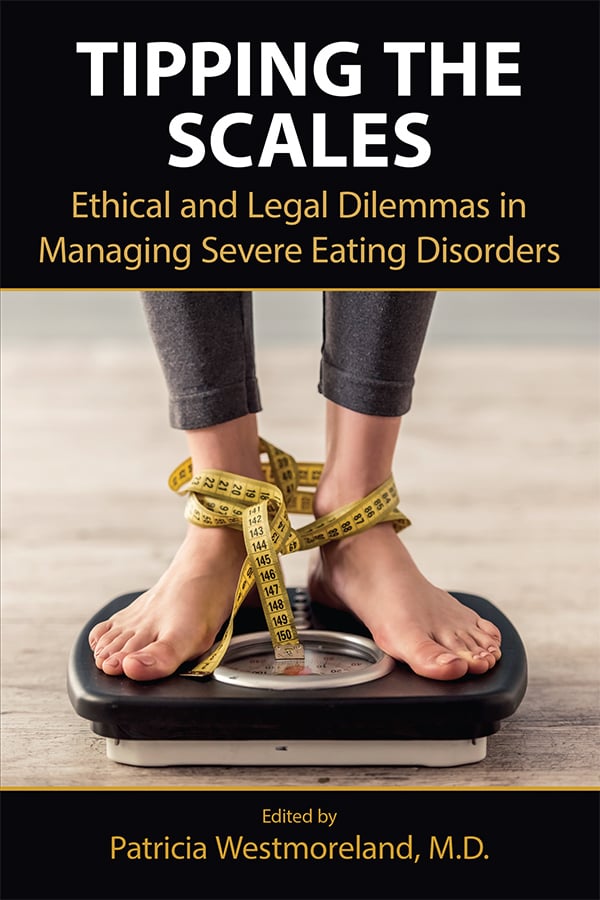Patricia Westmoreland, M.D.
Books published by American Psychiatric Association Publishing represent the findings, conclusions, and views of the individual authors and do not necessarily represent the policies and opinions of American Psychiatric Association Publishing or the American Psychiatric Association.
Names: Westmoreland, Patricia, editor. | American Psychiatric Association Publishing, issuing body.
Title: Tipping the scales : ethical and legal dilemmas in managing severe eating disorders / edited by Patricia Westmoreland.
Description: First edition. | Washington, DC : American Psychiatric Association Publishing, [2021] | Includes bibliographical references and index.
Identifiers: LCCN 2020040579 (print) | LCCN 2020040580 (ebook) | ISBN 9781615373499 (paperback ; alk. paper) | ISBN 9781615379743 (ebook)
Subjects: MESH: Anorexia Nervosa—therapy | Psychiatry—ethics | Psychiatry—legislation & jurisprudence | Bulimia Nervosa—therapy | Feeding and Eating Disorders of Childhood—therapy
Classification: LCC RC552.A5 (print) | LCC RC552.A5 (ebook) | NLM WM 175 | DDC 616.85/26206—dc23
A CIP record is available from the British Library.
Contents
Contributors
Introduction
Philip S. Mehler, M.D.
Russell Marx, M.D.
Ken Weiner, M.D.
1 Treatment of Eating Disorders: An Historical Perspective
Michael Spaulding-Barclay, M.D., M.S.
Arnold Andersen, M.D.
Joel Yager, M.D.
2 Basic Principles of Ethics
Kaila Rudolph, M.D., M.P.H., M.B.E.
Rebecca Weintraub Brendel, M.D., J.D.
3 Coercion in Treatment
Angela S. Guarda, M.D.
Colleen C. Schreyer, Ph.D.
4 Mental Capacity in Anorexia Nervosa
Isis Elzakkers, M.D., Ph.D.
Cushla McKinney, Ph.D., M.B.H.L.
5 Role of Medical Guardianship
Dennis Gibson, M.D.
Philip S. Mehler, M.D.
Patricia Westmoreland, M.D.
6 Civil Commitment
Wayne Bowers, Ph.D.
Michael Stafford, J.D.
Patricia Westmoreland, M.D.
7 Severe Eating Disorders in Children and Adolescents: How Are Childhood Eating Disorders Different?
Elizabeth Wassenaar, M.D.
Barbara Kessel, D.O.
Anne-Marie O’Melia, M.D.
8 Novel Treatments for Patients With Severe and Enduring Eating Disorders
Leah Brar, M.D.
Elizabeth Wassenaar, M.D.
Anne-Marie O’Melia, M.D.
9 Harm Reduction
Ovidio Bermudez, M.D., FAAP, FSAHM, FAED, Fiaedp, C.E.D.S.
Phillipa Hay, M.D.
Stephen Touyz, Ph.D.
10 Eating Disorders and Palliative Care
Patricia Westmoreland, M.D.
Libby Erickson, D.O.
Ovidio Bermudez, M.D., FAAP, FSAHM, FAED, Fiaedp, C.E.D.S.
11 Futility
Cynthia M.A. Geppert, M.D., M.A., M.P.H., M.B.E.,
D.P.S., M.S.J, FACLP, DFAPA, FASAM, HEC-C
Joel Yager, M.D.
Jeanne Kerwin, D.M.H., HEC-C
12 Eating Disorders and Physician-Assisted Death
Mark Komrad, M.D.
Annette Hanson, M.D.
Index
Contributors
Arnold Andersen, M.D.
Professor Emeritus, Department of Psychiatry, University of Iowa College of Medicine, Iowa City, Iowa
Ovidio Bermudez, M.D., FAAP, FSAHM, FAED, Fiaedp, C.E.D.S.
Clinical Professor of Pediatrics and Psychiatry, University of Colorado School of Medicine, Eating Recovery Center, Denver, Colorado
Leah Brar, M.D.
Attending Psychiatrist, Medical Center of Aurora; Assistant Professor of Psychiatry, Rocky Vista University, Aurora, Colorado
Wayne Bowers, Ph.D.
Professor, Department of Psychiatry, Roy and Lucille Carver College of Medicine, University of Iowa, Iowa City, Iowa
Rebecca Weintraub Brendel, M.D., J.D.
Director, Master of Bioethics Degree Program; Associate Director, Center for Bioethics; Assistant Professor of Psychiatry, Harvard Medical School, Boston, Massachusetts
Isis Elzakkers, M.D., Ph.D.
Formerly with Altrecht Eating Disorders Rintveld, Altrecht Mental Health Institute, Utrecht, The Netherlands
Libby Erickson, D.O.
Attending Psychiatrist, Eating Recovery Center, Denver, Colorado
Cynthia M.A. Geppert, M.D., M.A., M.P.H., M.B.E., D.P.S., M.S.J, FACLP, DFAPA, FASAM, HEC-C
Ethics Consultant, VA National Center for Ethics in Health Care, Washington, DC; Chief Consultation Psychiatry, New Mexico VA Health Care System; Professor of Psychiatry and Internal Medicine and Director of Ethics Education, University of New Mexico School of Medicine, Albuquerque, New Mexico; Adjunct Professor of Bioethics, Alden March Bioethics Institute, Albany Medical College, Albany, New York
Dennis Gibson, M.D.
Associate Professor, Department of Internal Medicine, University of Colorado; Assistant Medical Director, ACUTE at Denver Health, Denver, Colorado
Angela S. Guarda, M.D.
Stephen and Jean Robinson Associate Professor of Psychiatry and Behavioral Sciences and Director, Johns Hopkins Eating Disorders Program, Johns Hopkins School of Medicine, Baltimore, Maryland
Annette Hanson, M.D.
Clinical Assistant Professor and Director, Forensic Psychiatry Fellowship, University of Maryland, Clifton T. Perkins Hospital, Jessup, Maryland
Phillipa Hay, M.D.
Professor and Foundation Chair of Mental Health, Translational Health Research Institute, Western Sydney University School of Medicine, Penrith, New South Wales, Australia
Jeanne Kerwin, D.M.H., HEC-C
Consultant in Bioethics and Palliative Care, Atlantic Health System, Morristown; Faculty, Drew University, Medical Humanities Graduate Program, Madison, New Jersey
Barbara Kessel, D.O.
Attending Psychiatrist, Eating Recovery Center, Denver, Colorado
Mark Komrad, M.D.
Clinical Assistant Professor of Psychiatry, University of Maryland, College Park, Maryland; Clinical Assistant Professor of Psychiatry, Tulane University, New Orleans, Louisiana; Instructor in Psychiatry, Johns Hopkins University, Baltimore, Maryland
Cushla McKinney, Ph.D., M.B.H.L.
Research Fellow, Department of Pathology, Dunedin School of Medicine, University of Otago, Dunedin, New Zealand
Russell Marx, M.D.
Associate Professor of Psychiatry, University of Colorado; Attending Psychiatrist, ACUTE at Denver Health, Denver, Colorado
Philip S. Mehler, M.D.
Glassman Professor of Internal Medicine, University of Colorado; Founder and Executive Medical Director, ACUTE at Denver Health; President and Chief Science Officer, Eating Recovery Center, Denver, Colorado
Anne-Marie O’Melia, M.D.
Chief Medical Officer, Eating Recovery Center, Denver, Colorado
Kaila Rudolph, M.D., M.P.H., M.B.E.
Attending Consultation Liaison Psychiatrist, Boston Medical Center; Instructor of Psychiatry, Boston University School of Medicine, Boston, Massachusetts
Colleen C. Schreyer, Ph.D.
Assistant Professor of Psychiatry and Behavioral Sciences, Johns Hopkins School of Medicine, Baltimore, Maryland
Michael Spaulding-Barclay, M.D., M.S.
Medical Director, Child and Adolescent Services, Eating Recovery Center, Denver, Colorado
Michael Stafford, J.D.
City and County Attorney, Denver County, Denver, Colorado
Stephen Touyz, Ph.D.
Professor Emeritus, School of Psychology and Inside Out Institute, Boden Collaboration, Charles Perkins Centre, University of Sydney 2006, New South Wales, Australia
Elizabeth Wassenaar, M.D.
Medical Director, Eating Recovery Center, Denver, Colorado
Ken Weiner, M.D.
Founder and former CEO, Eating Recovery Center, Denver, Colorado
Patricia Westmoreland, M.D.
Forensic Psychiatrist and Consultant, ACUTE at Denver Health; Adjunct Assistant Professor of Psychiatry, University of Colorado, Denver, Colorado
Joel Yager, M.D.
Professor, Department of Psychiatry, Anschutz Medical Campus, Aurora, Colorado

